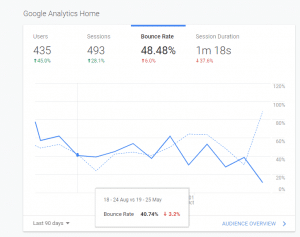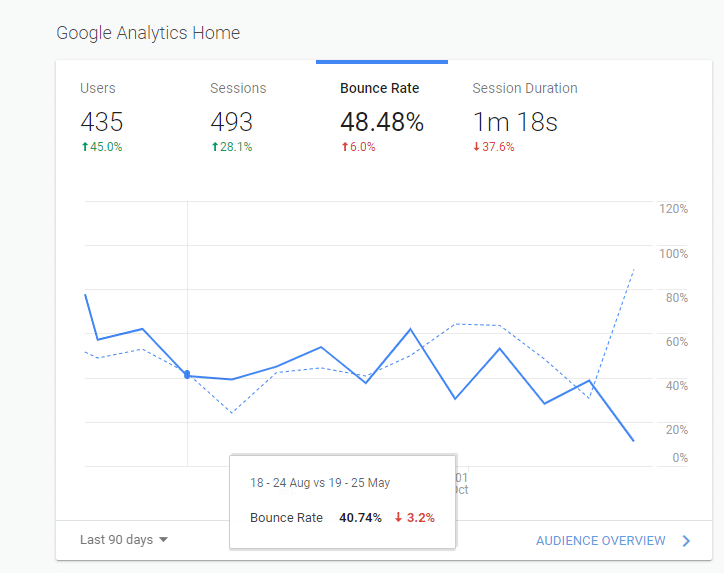How Does Bounce Rate Affect SEO?
iThere is so much data thrown at you in the online world we live in. As you dive into SEO, it can be overwhelming to learn what exactly all the numbers mean. What are meta descriptions, alt texts, and keywords? How do you know what to track and then how do you track it? Well, I am here to demystify what a bounce rate is. And how it works with SEO to help you get more clients.
What is a Bounce Rate?
Simply put, the bounce rate is how many people only go to one page on your website. For example, they go to the home page and then don’t continue on to a service page. This is problematic for obvious reasons. We want people to look at your service pages and of course, schedule an appointment with you!
In the SEO consulting work we do, we track the bounce rate of counseling websites we work with. If a bounce rate is too high, we know it’s time to make a change. Often, it means we need to make your site easier to navigate. We want potential clients to be able to find the pages they need to to learn more about your practice and how to work with you.
How do I know what it is?
 You can find the bounce rate for your counseling website in Google Analytics by going to the home page, and there on the main screen is a percentage. This percentage is your bounce rate!
You can find the bounce rate for your counseling website in Google Analytics by going to the home page, and there on the main screen is a percentage. This percentage is your bounce rate!
The bounce rate for your overall website is what we look at most often. We want to be sure that no matter which page someone finds first, they continue to stay on your site to see ALL you have to offer. However, we’ll occasionally check to see if one page of your website has a particularly high bounce rate (an indicator we want to change the content on it) or low bounce rate (what’s going well & how can we duplicate it?).
In general, we’ve heard to aim for a bounce rate between 50-70%. However, in our work we’ve noticed that with a little effort most of the counseling websites we work on can stay under 60%. At this number, a large amount of people are staying on your site to read what you have to stay. It also factors in that there will be some people who know exactly what they’re looking for and don’t go to multiple pages.
How do I know if my Bounce Rate is too high?
There are a number of things that can impact bounce rate. For example, if you have just started blogging and don’t have internal links built in, people might find your blog and not know how to navigate to the other pages on your site. Or maybe they got the content they desired and then left the blog post.

To check whether this is why your site has a high bounce rate, you can check the individual page bounce rates in Google Analytics as well. This is done by going to the audience tab, and clicking all pages, then bounce rate. This way you can see what the bounce rate is on each individual page. Thus, you will know whether it is a hugely popular blog post skewing your data, or whether you need to work on making your page easier to navigate.
3 SEO Tips to Reduce your Bounce Rate:
1) Have an attractive and easy-to-navigate website.
If your site looks good and is easy to move around, people are more likely to click through it. Especially, to find the information they’re dying to know. One place to start is by looking at your menu bar. Your menu bar helps potential clients find the information they are looking for about your private practice and move quickly throughout your site.
2) Offer quality content that leaves people wanting more.
If your copy (the words on your website) is strong, potential clients are going to want to keep reading and learn more about your practice and who you serve! Strongly written copy that has been SEO optimized will help you convert website viewers into paying clients!
3) Use internal links and calls to action to keep people moving on your site.
Internal links are links that go from one page to another on your website. This helps people easily navigate and find what they are looking for. For example, if you wrote an amazing blog post about anxiety, include a link or two to your anxiety service page so viewers can learn more about how you can help them through anxiety treatment.
Calls to action help website viewers know what to do next. If they find themselves on your website wondering how to book with you, then your website isn’t doing its job! Make it easy for people to work with you, and you’ll get more calls.
Are you ready to get serious about SEO for your counseling website?
As an SEO consulting service for mental health professionals, we offer services that will help get your counseling website to the top of Google. Our monthly SEO packages help private practice therapists fill their schedules with the clients of their dreams and our SEO training services help practice owners optimize their own websites.
To begin working with Simplified SEO Consulting:
- Book a Free Consult.
- Talk with one of our SEO Specialists.
- Begin ranking higher on Google.

SEO Consulting Services offered at Simplified SEO Consulting
As an seo consulting service for therapists, getting our clients to the top of Google is our favorite thing. We offer a free seo consultation over Zoom, because we want to make sure to match you with the right service. It’s important you get the best possible return on any investment you. make on your page. Through talking to us, you’ll be able to figure out what service is the best match. For busy practice owners who just don’t have the time (or desire) to work on their own Search Engine Optimization & are ready to outsource, we offer monthly “Done for you” SEO packages. However, some practice owners are more the DIY type and want to be hands on with optimizing their own website. We offer several SEO training options including a self paced online SEO course specifically designed for counselors, psychologists & psychiatrists as well as in person SEO training in our “Learn SEO in a Weekend” workshops.




Leave a Reply
Want to join the discussion?Feel free to contribute!